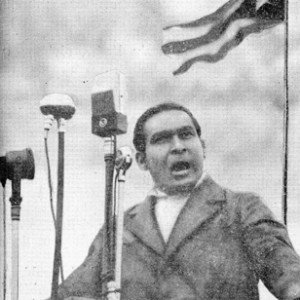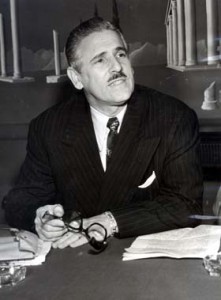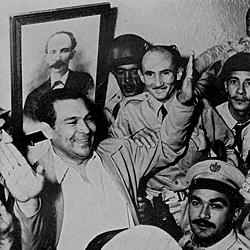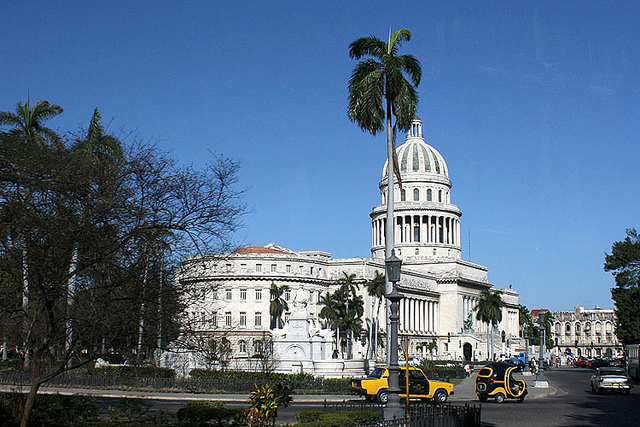On March 9, 1952 Batista attended an election rally in Matanzas. He returned to Havana at night and in a house in Kohly interviewed several of the conspirators before proceeding towards Kuquine, where they waited for other conspirators. Prio, who had spent the weekend in La Chata, enjoyed the carnival that day and walked around the Prado, in a convertible, accompanied by her two young daughters. Brother Antonio danced all night at the cabaret Sans Souci, and Segundo Curti, Minister of Interior, dined at the restaurant Rio Mar. The next day, the president would make the announcement of his new cabinet as Prime Minister Curti. Would not chance it.
Without firing a shot
In Columbia, Captain Damaso Sogo, a senior guard, waiting for the coup flanquearles entry by post 6, but ultimately Batista, suspicious, decided to enter the post in April, at the monument to Finlay, prompting arrived at camp a minute after the scheduled time. The sentry outside the plot was stopped by the caravan of five cars to escorting as many pursuers, but Captain Garcia Tunon, pistol in hand, descended from one of the vehicles and removed the chain preventing access. Sogo, already present at the site, told Batista in an armored truck moved to the head of the Regiment 6, where they waited for other officers of “revolutionary junta”. Before, First Lieutenant Rodriguez Avila, bolder man beat the view of many, had put the tanks in preparation for action.
Detained principal chiefs, Columbia was left to the coup without the need to fire a shot. There was also no resistance at La Cabaña, home of the 7th Regiment, Artillery, or in La Punta, where lay the General Staff of the Navy. The National Police headquarters fell into the hands of Lieutenant tame Salas Cañizares who immediately ordered the occupation of the Palace of the Workers and the Popular Socialist Party offices, telephone exchange, in Eagle Street, and the power plant Tallapiedra and melons auxiliary plants, as well as radio stations. Inside, the heads of regiments, except Colonel Rey Fernandez, Pinar del Rio, were opposed to the coup, but ultimately none opposed it and ended up resigning over.
When Colonel Vicente Leon, head of the Military House Palace called La Chata Prio to inform that Batista had gotten into Columbia, and the president knew the news and then tell you about their attempts to ward off the blow, he ordered that, as he came, did fire against any force that tried to take over the executive mansion. Already at this stage, acting alone, Leon kept detained the captain Juan V. Mendive presidential family dentist, who, at the head of a group of sailors, had tried to occupy the building.
WE THE LAW
At 4:30 am, nearly two hours after the entry of Columbia Batista, Prio reached the Presidential Palace. He was accompanied by his wife, his brothers Paco and Antonio, and Rafael Izquierdo, one of his assistants. There, among other civilian collaborators were Lancis Segundo Curti and Felix, ministers of Interior and Education, respectively, the head of the Navy, officers of the garrison and military aides. Someone suggested that he move to one of the provinces where the garrison to remain loyal and yet the President telephoned the leaders of some of the regiments of the interior. He spoke with Colonel Eduardo Elena Martin, head of the regiment in April, Matanzas. He asked what was his position on the coup and the officer said he would remain at his post while to fulfill its obligation to defend the Constitution and laws of the Republic. Earlier, in response to a message received from Columbia, the officer had said he would not obey illegal orders whatever their origin and that would build to meet its obligations under oath, words that drew Batista’s nerves, they replied: “We are the law. Follow orders or resign the command! ”
Newton says the historian in his book Briones Montoto General Elena back to Martin assembled the principal officers of his regiment, as previously done with the troops. If found environment, “formulate a plan to counter the weapons to consolidate the coup.” Only one officer was prepared to support him, although most of those gathered was not in favor or against the coup. “I therefore believe that it was not worth resisting,” Briones points.
Cantillo Colonel, Chief of Aviation, Batista joined when everyone expected him to do just the opposite, had taken over as adjutant general of the army. He communicated with Colonel Martin Elena to reiterate that he disagreed with the coup. They maintained this dialogue.
Cantillo: I thought like you, but I’ve been convinced otherwise.
Elena Martin: I’m sorry that you have been able to convince …
Cantillo: Look to Columbia and La Cabaña already joined and you are staying alone.
Elena Martin: I never take it alone while the side of reason and justice.
Cantillo: It is up to you!
Elena Martin: It will be up to you all and history!
Much has been repeated that Prio left the Presidential Palace Matanzas bound to lead the resistance and already in that province learned the dismissal of Colonel. At trial in May 59 was followed the military coup, Elena Martin gave evidence that he did not remember that at any time the President will talk about the possibility of moving to Matanzas. “It was not to Matanzas to where it should go, but for Columbia. And if you need me I accompanied him. I did not tell because he did not ask me, “he said then.
http://www.youtube.com/watch?v=u5JRdI0G7v8
AT LA VIBORA, HAVANA
On the third floor of the Palace, and Antonio Paco Prio were people dressed pessimism. Other been pressured the president to resist. The head of a troop of fifty soldiers arrived to defend the President was placed under arrest when they found that their intentions were to do just the opposite. Two members of the escort Prio fought fire with the crew of a pursuer who arrived the building through the front door Monserrate threw encounter deaths on both sides. Alvaro Barba came to offer their solidarity to the government on behalf of the Federation of University Students (FEU). Claimed orders and weapons. Erroneously thought that the Executive had already drawn up a plan to defend. Prio made to submit to the University of the requested weapons. They never made it. You had to get them out of the barracks of San Ambrosio and since that facility was in the hands of the coup.
About eight in the morning, left Prio Palace in a car with plate Buick particular. By choice an escort with him reduced to be separated a few blocks from the Palace. The vehicle that transported the President still continued alone. Briones Montoto doubt that the president moved to Matanzas. Information that appeared in those days in the newspaper The Crucible realizes that, with his wife, sought refuge in the house of the engineer Jug, the Viper, and the one o’clock the next day, driving his own car, picked Mexico’s ambassador there to lead them to the embassy of that country, online and A. Prio leave the country without having renounced the presidency.
Expresses Briones Montoto: “With the surrender of the presidential palace and military barracks and asylum Prio later, everything was completed. In the imaginary race had begun between Chibas and Aureliano … the winner was. ” He also says: “The event that had just occurred was the result of the analysis capability Batista, not its value.”
Recall that we alluded to before Batista cornered on the staff while captain Tuñón Garcia gave the orders in the first moments of the coup. The roles changed at noon when many civilians entered Columbia cheering the former general. The officers of the coup, even Garcia Tunon, then cornered ended. “From that moment, Batista is the one that controls the blow. It was a maneuver very well done and with much sense because what had started as a few military coup dissatisfied with a civilian head, Batista became a hit Batista. And from that moment began to decide everything, “writes Brown. Old Tabernilla appointed as chief of staff and allowed the nail to Garcia Tunon, real architect of the coup, which would have to settle for the stars of Coronel and the head of Columbia. True, months later, to claim their partial, promoted him to General, but his army days were numbered.
Sources: CiroBianchiRoss/InternetPhotos/TheCubanHistory.com
Military Coup of Fulgencio Batista (03/10/1952)/ The Cuban History/ Arnoldo Varona, Editor
10 de Marzo, 1952- Golpe Militar de Batista en Cuba
El 9 de marzo Batista asistió a un mitin electoral en Matanzas. Regresó a La Habana de noche y en una casa del reparto Kohly se entrevistó con varios de los complotados antes de proseguir rumbo a Kuquine, donde lo esperaban otros conspiradores. Prío, que había pasado el fin de semana en La Chata, disfrutó ese día de los carnavales y paseó por el Prado, en un automóvil descapotable, en compañía de sus dos pequeñas hijas. El hermano Antonio bailó durante toda la noche en el cabaret Sans Souci, y Segundo Curti, ministro de Gobernación, cenó en el restaurante Río Mar. Al día siguiente, el presidente haría el anuncio de su nuevo gabinete con Curti como Primer Ministro. No tendría chance de hacerlo.
SIN DISPARAR UN TIRO
En Columbia, el capitán Dámaso Sogo, oficial superior de guardia, esperaba a los golpistas para flanquearles la entrada por la posta 6, pero a última hora Batista, desconfiado, decidió entrar por la posta 4, frente al monumento a Finlay, lo que motivó que llegara al campamento un minuto después de la hora prevista. El centinela, ajeno al complot, dio el alto a aquella caravana de cinco automóviles a los que escoltaban otras tantas perseguidoras, pero el capitán García Tuñón, pistola en mano, descendió de uno de los vehículos y retiró la cadena que impedía el acceso. Sogo, presente ya en el lugar, indicó a Batista que en un camión blindado se trasladara a la jefatura del Regimiento 6, donde lo esperaban los demás oficiales de la «junta militar revolucionaria». Antes, el primer teniente Rodríguez Ávila, el hombre más audaz del golpe a juicio de muchos, había puesto los tanques en zafarrancho de combate.
Detenidos los jefes principales, Columbia quedó en manos de los golpistas sin que fuera necesario hacer un solo disparo. Tampoco hubo resistencia en La Cabaña, sede del Regimiento 7, de Artillería, ni en La Punta, donde radicaba el Estado Mayor de la Marina de Guerra. La jefatura de la Policía Nacional cayó mansita en manos del teniente Salas Cañizares que dispuso de inmediato la ocupación del Palacio de los Trabajadores y de las oficinas del Partido Socialista Popular, de la central telefónica, en la calle Águila, y de la planta eléctrica de Tallapiedra y las plantas auxiliares de Melones, así como de las estaciones de radio. En el interior, los jefes de regimientos, salvo el coronel Fernández Rey, de Pinar del Río, se mostraban contrarios al golpe, pero a la larga ninguno se le opuso y acabaron por resignar el mando.
Cuando el coronel Vicente León, jefe de la Casa Militar de Palacio llamó a La Chata para informar a Prío de que Batista se había metido en Columbia, ya el presidente conocía la noticia y luego de comentarle sobre sus intentos por conjurar el golpe, le ordenó que, mientras él llegaba, hiciera fuego contra cualquier fuerza que intentara apoderarse de la mansión del Ejecutivo. Ya a esas alturas, actuando por su cuenta, León mantenía detenido al capitán Juan V. Mendive, dentista de la familia presidencial, que, al frente de un grupo de marineros, había intentado ocupar el edificio.
SOMOS LA LEY
A las 4:30 de la mañana, casi dos horas después de la entrada de Batista en Columbia, llegó Prío al Palacio Presidencial. Lo acompañaban su esposa, sus hermanos Paco y Antonio, y Rafael Izquierdo, uno de sus ayudantes. Allí, entre otros colaboradores civiles, estaban Segundo Curti y Félix Lancís, ministros de Gobernación y Educación, respectivamente, el jefe de la Marina de Guerra, oficiales de la guarnición y edecanes militares. Alguien le sugirió que se trasladara a alguna de las provincias donde la guarnición se mantuviera todavía leal y el Presidente se comunicó por teléfono con los jefes de algunos de los regimientos del interior. Habló con el coronel Eduardo Martín Elena, jefe del regimiento 4, de Matanzas. Le preguntó cuál era su posición respecto al golpe y el oficial respondió que permanecería en su puesto mientras pudiera cumplir con su obligación de defender la Constitución y las leyes de la República. Con anterioridad, en respuesta a un mensaje recibido de Columbia, el alto oficial había expresado que no acataría órdenes ilegales cualquiera que fuera su procedencia y que se concretaría a cumplir con las obligaciones que le imponía su juramento, palabras que sacaron de quicio a Batista, que ripostó: «¡Somos la ley. Cumpla órdenes o resigne el mando!»
Dice el historiador Newton Briones Montoto en su libro General regreso que Martín Elena reunió a los oficiales principales de su Regimiento, como antes hizo con la tropa. Si encontraba ambiente, «formularía un plan para oponerse con las armas a la consolidación del golpe». Solo un oficial se manifestó dispuesto a secundarlo, aunque la mayoría de los reunidos no estaba a favor ni en contra del cuartelazo. «Por ello consideró que no valía la pena resistirlo», puntualiza Briones.
El coronel Cantillo, jefe de la Aviación, sumado a Batista cuando todos esperaban que hiciera justamente lo contrario, había asumido el cargo de ayudante general del ejército. Con él se comunicó el coronel Martín Elena para reiterar que estaba en desacuerdo con el golpe. Sostuvieron este diálogo.
Cantillo: Yo pensaba igual que tú, pero me han convencido de lo contrario.
Martín Elena: Lamento mucho que te hayan podido convencer…
Cantillo: Mira que Columbia y La Cabaña ya se han sumado y te vas a quedar solo.
Martín Elena: Nunca me consideraré solo mientras esté al lado de la razón y la justicia.
Cantillo: Allá tú.
Martín Elena: Allá ustedes y la historia.
Mucho se ha repetido que Prío salió del Palacio Presidencial con destino a Matanzas a fin de encabezar la resistencia y que ya en esa provincia se enteró de la destitución del Coronel. En el juicio que en mayo del 59 se siguió a los militares golpistas, Martín Elena declaró como testigo que no recordaba que en ningún momento el Presidente le hablara de la posibilidad de trasladarse a Matanzas. «No era para Matanzas para donde debía ir, sino para Columbia. Y si me necesitaba yo lo acompañaba. No se lo dije porque él no me lo preguntó», afirmó entonces.
http://www.youtube.com/watch?v=u5JRdI0G7v8
EN LA VÍBORA
En el tercer piso de Palacio, Paco y Antonio Prío eran el pesimismo disfrazado de personas. Otros conminaban al mandatario a resistir. El jefe de una tropa de cincuenta soldados llegada para defender al Presidente fue puesto bajo arresto cuando se comprobaron que sus intenciones eran las de hacer justamente lo contrario. Dos miembros de la escolta de Prío se batieron a tiros con los tripulantes de una perseguidora que arribó al edificio por la puerta de la calle Monserrate; encuentro que arrojó muertos de ambas partes. Álvaro Barba llegó para ofrecer su solidaridad al gobierno en nombre de la Federación Estudiantil Universitaria (FEU). Reclamó órdenes y armas. Pensaba erróneamente que ya el Ejecutivo había elaborado un plan para defenderse. Prío dispuso el envío a la Universidad de las armas solicitadas. Nunca llegaron. Había que sacarlas del cuartel de San Ambrosio y ya esa instalación estaba en manos de los golpistas.
Sobre las ocho de la mañana, Prío salió de Palacio en un auto marca Buick con chapa particular. Por decisión propia lo acompañaba una escolta reducida que se le separó a pocas cuadras de Palacio. El vehículo que trasportaba al todavía Presidente de la República siguió solo. Briones Montoto duda de que el mandatario se trasladara a Matanzas. Una información que apareció en esos días en el periódico El Crisol da cuenta de que, en compañía de su esposa, buscó refugio en la casa del ingeniero Jarro, en la Víbora, y que a la una de la mañana del día siguiente, manejando su propio automóvil, los recogió allí el embajador de México a fin de conducirlos a la sede diplomática de ese país, en Línea y A. Prío saldría del país sin haber renunciado a la primera magistratura.
Expresa Briones Montoto: «Con la rendición del Palacio Presidencial y de los cuarteles militares y el asilo posterior de Prío, todo quedaba concluido. En la carrera imaginaria que se había iniciado entre Chibás y Aureliano… el vencedor era ». Dice además: «El acontecimiento que se acababa de producir era el resultado de la capacidad de análisis de Batista, no de su valor».
Recordemos que aludimos antes a un Batista arrinconado en el Estado Mayor mientras que el capitán García Tuñón daba las órdenes en los primeros momentos del golpe. Los papeles cambiaron al mediodía cuando numerosos civiles entraron en Columbia dando vivas al ex general. Los oficiales del golpe, incluso García Tuñón, terminaron arrinconados entonces. «A partir de ese momento, Batista es el que controla el golpe. Fue una maniobra muy bien realizada y con mucho sentido porque lo que había comenzado como un golpe de unos militares insatisfechos con un jefe civil, Batista lo convirtió en un golpe de Batista. Y a partir de ese momento empezó a decidirlo todo», escribe Briones. Designó al viejo Tabernilla como jefe del Estado Mayor y se la dejó en la uña a García Tuñón, verdadero artífice del cuartelazo, que tendría que conformarse con las estrellas de Coronel y con la jefatura de Columbia. Cierto es que meses después, ante el reclamo de sus parciales, lo ascendió a General, pero sus días en el Ejército estaban contados.
Sources: CiroBianchiRoss/InternetPhotos/TheCubanHistory.com
Military Coup of Fulgencio Batista (03/10/1952)/ The Cuban History/ Arnoldo Varona, Editor



 Fulgencio Batista Military Coup * Golpe Militar de Marzo 10, 1952.
Fulgencio Batista Military Coup * Golpe Militar de Marzo 10, 1952.


